Let It Be Game Over
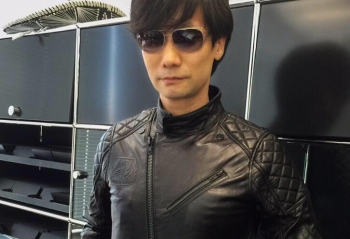
Editorial by Maxwell N, Posted on November 3, 2015
NOTE: The following may contain spoilers for Metal Gear Solid V: The Phantom Pain.
After years of hype, anticipation and worries, Metal Gear Solid V: The Phantom Pain has come and gone, in the same kind of flash that most games these days seem to. There was more interest in The Phantom Pain than possibly any other Metal Gear, with fresh new players jumping in for a taste of Hideo Kojima’s Tactical Espionage Action/Operations than ever before. This can be thanked to the fact that there are simply a lot more people playing video games than they were when Metal Gear Solid 4: Guns of The Patriot came out, as well as the press, whether positive or negative, as the days led up to the release of The Phantom Pain. Kojima leaving Konami might have one of the best things that happened to the series, from a marketing point of view.
However, a good number of us grew up with Hideo Kojima’s long-winded storyline, or “saga” as the marketers at Konami like to call it. Metal Gear brought us many years of joy, and depending on the game, sorrow. Still, for some of us, it was just a game series with a goofy yet charming over-arching storyline, and most importantly fun gameplay, while for others it seemed to have been the most important piece of work since the Bible, with every single piece of plot and dialogue forming a sort of canon only understood by a few.
With that in mind, it’s no surprise that the first-rumors-then-news about Kojima leaving Konami, the Metal Gear franchise and the Silent Hills project (a collaboration with film director Guillermo Del Toro, for the uninitiated) caused an uproar, with or without all the facts available to the general public—but that’s another subject for another time. This uproar was to be expected, but what many did not expect, though I dare say some did, was that letting go of Metal Gear would be harder for some than for others.
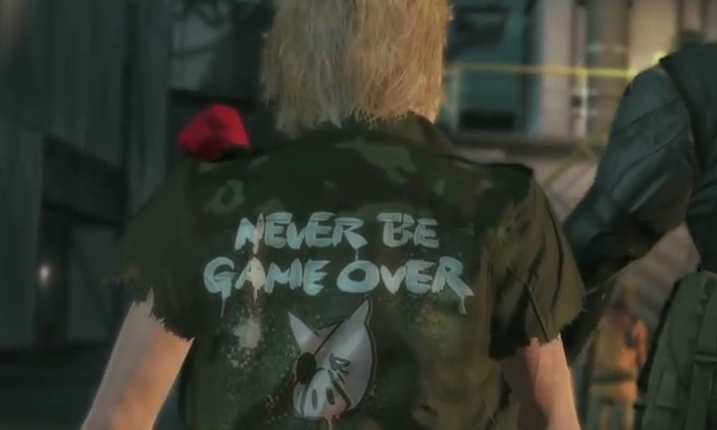
Since when have we started taking Liquid’s advice?
Try to have a conversation or look up anything about Metal Gear, and The Phantom Pain in particular, and you are likely come across several nutty, totally-out-there conspiracy theories that’re grasping at straws and making all kinds of unfounded, silly associations about how there is something more to the game than the obvious, more than what meets the eye, and that the truth is out there, or in the game, or wherever. That the game isn’t “over” yet, that there is hidden content within the game ranging from a secret mission to a whole “act” of the game, depending on which conspiracy theory you prescribe to. Some would even argue that the cut content within the game is intentionally supposed to give you some sort of “phantom” feeling, a feeling that would usually and rationally be reserved for “disappointment”.
CUT AT WILL

Yes, it’s very true that there is more than what the naked eye sees when it comes to The Phantom Pain. This is because the game’s overall story, and arguably certain elements of the gameplay, were left incomplete upon the game’s release.
We don’t know why, but one can assume that this game had a troubled development, especially with the supposed but possibly, very likely, stressful conditions that Kojima and his team had to work under as a result of Konami’s actions. Or maybe the game just had a troubled development because the team was spread too thin trying to come up with too many different and diverse ideas that couldn’t fit the overall game that they were trying to piece together.
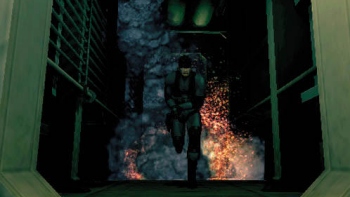
Content is cut all the time during video game development; it’s standard practice, a part of really any creative process. Rarely, though, is to the degree seen in The Phantom Pain, where a whole segment of the story is left untold and simply hanging (or levitating), at least within the game itself. This piece of the story was later revealed to be part of a cut mission, Kingdom of the Flies, assumed by some fans to be part of a missing “third” chapter of the game, and the rough CG and concept art of the game was released as a way to provide closure to the story. Other cut content has been noticed or discovered since release, including dialogue, information regarding guard dog enemies, decoys that look like Lisa from P.T. (the “playable teaser” for the Silent Hills project) and so on.
ATOMS FOR PEACE
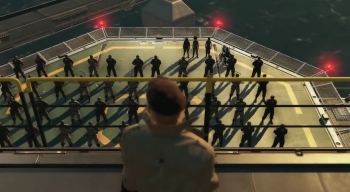
Then there is content that is in the game but hasn’t been unlocked or triggered yet. The biggest examples are scenes, or an event altogether if you’d like, regarding global nuclear disarmament and/or armament, which you can find on YouTube if you’d like to take a look. This event was discovered via data-mining by fans, and was not officially confirmed until recently by Famitsu. The complete and full steps necessary to trigger the event are still a mystery, though some still think the key lies in “Peace”.
Such hidden content and Easter eggs are great, and absolutely welcome. They bring players together as a community, to try and figure things out, and also create an atmosphere of mystery and intrigue around the game. It’s the kind of depth that isn’t present in many games these days, which want to be more like plain movies than interactive video games. There is a place for movie-oriented games, but very rarely these days does a game take advantage of the video game medium to an extent such as this.
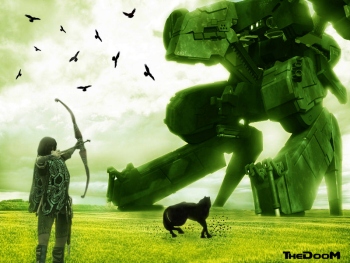
The discovery of the legitimate cut content is great, as well. There’s a reason why the discovery of cut content in video games became such a phenomenon of interest, especially on the internet. There are great websites that archive cut content from video games ranging from the trivial to the momentous, such as The Cutting Room Floor and Unseen 64. Shadow of the Colossus is easily one of my favorite games, and after that game originally came out for the PlayStation 2, there was a lot of mystery revolving around the cut content for that game, though many believed that this content was still accessible and playable in the game but simply hidden, with the most popular one being a secret 17th colossus. This obviously was not the case but The Cutting Room has a neat page that details everything that has been uncovered about the cut content from the game so far. It’s really cool.
I WANT TO BELIEVE
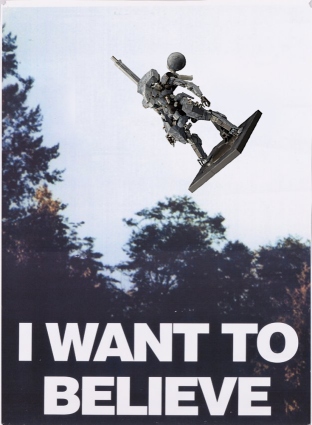
– FBI Special Agent Fox Mulder
However, there is a fine line between healthy curiosity and batshit absurdity. Many Shadow of the Colossus fans still believe that there is a hidden colossus still lurking within the game, waiting to be found. While conceptually a beautiful idea, it is ultimately false, as it has been proven by data-mining (even though it was very obvious that this was simply a myth without the need for data-mining). Then why does this digital legend still live on and why do people take solid facts to not be true, but see it as misinformation or easy answers to complicated ruses, plots and conspiracies?
This might be an example of a game’s ideas and themes working against its audience. Shadow of the Colossus (spoilers, if you haven’t played the game and care about exploring its themes and story as a first-hand experience) is all about exploring the unknown and taking on seemingly impossible challenges. The landscapes are mysterious and the world around you seems to hide more than what you can see. You are also led to believe things that are not true; you are just a puppet or a pawn, directed to fulfill a purpose that you did not knowingly sign up for. By the end, you feel used and misled.
Similarly, Metal Gear stories are always deceptive. Your boss might actually be an evil asshole, your whole life might be part of an orchestrated plan by a faceless organization, you might not who you think you are etc. It’s also easy to see why people would obsess over the “truth”; these games have taught them that nothing is as it seems, to trust no one. The difference here, however, is the same difference between fantasy and reality.
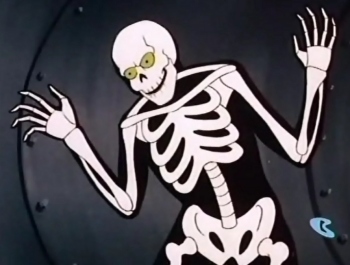
In reality, sometimes shit happens. Things don’t go according to plan. People leave and move on with their lives, or their lives end. These are the realities of life, and life is not easy. You have to deal with real loss, real tragedy and real heartache. Letting go is a very difficult but crucial part of human life. Life is uncaring and the solutions are easy, it’s the “doing them” part that’s difficult.
Fantasy, however, does not play by reality’s rules. In fantasy, Harry Potter was not left to rot under his horrible foster family’s staircase as a meekly, lonely orphan. His parents were actually killed as part of a conspiracy orchestrated by an evil organization and their leader, and he was a special son chosen to be part of a magical world that took him away from his Muggle worries. In The X-Files, Fox Mulder was not a crazy nut babbling about aliens, demons and government conspiracies; he was right about most everything but his want for the truth was being suppressed by those who did not want him to succeed; it asks the question: what if that tinfoil hat wearing weirdo who goes on about supernatural mumbo jumbo was actually right the whole time?

It’s easier to escape than to face the truth, which is unhealthy. It’s like nostalgia, eating away at self-confidence and drowning a person’s ability to become bigger than they used to be.
There is a reason why even after countless demonstrations done to prove that the United States was indeed able to land Man on the Moon, many still believe that the landing was staged in Hollywood. It’s easier to believe the American government would lie to win the space race, because the idea of Man making it to the moon, previously considered a fantasy-place, is too hard to accept. Ultimately, it’s insulting and immensely ignorant to think that man cannot achieve such goals. That’s why Ancient Aliens thinks that when Einstein was simply chilling in his study, thinking to himself, he was actually in contact with aliens, who were uploading information to his brain (I’m not joking, that’s in an actual episode).

It’s also easy to believe that a man who created “Joakim Mogren” as a fake identity when promoting The Phantom Pain and created a secret free, cryptic-as-fuck playable teaser for what was then an upcoming game, and used Solid Snake for promotional trailers of a game where you would not be playing as him for the bulk of it, would lie and conceive a conspiracy to hide a crucial part of the game within The Phantom Pain. As a result, we have a huge amount of fans that are cooking up theories that would make even Fox Mulder’s head spin.
It’s hard to believe that a developer, highly regarded by fans to be untouchable and flawless, would make mistakes, fall below expectations or simply would not be able to finish MGSV’s development properly due to very real issues within Konami and his life.
LETTING GO
Mystery is healthy. However, blind but willful ignorance often leads to hysteria, which is the enemy of rational thought. More cut content from The Phantom Pain will be found eventually, and maybe the truth behind what happened between Kojima and Konami will be known. In order to enjoy ourselves for the future, we have to let it be game over. Not as a collectivist mob, but as individuals.
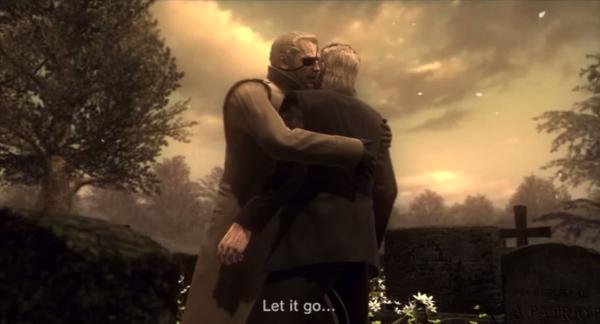
Listen to Good Guy John instead.
Clinging on to a corpse is unhealthy. This is why as a society we have burials and why we keep ashes of those incinerated. Letting go does not mean forgetting, it means enjoying what you had and appreciating the memories. To honor Metal Gear, let it go. Enjoy Metal Gear Online, if that’s your thing, or help uncover the actual steps needed to be taken within the game to trigger that nuclear event. Enjoy Kojima’s other works, such as Policenauts (a fan translation for English is available) or Snatcher. Play Metal Gear and Metal Gear 2: Solid Snake on MSX; I’m sure most of you haven’t. Enjoy the great spin-offs the franchise inspired, like the AC!D games or Ghost Babel. Hell, make fun of and morbidly enjoy Metal Gear for NES, Snake’s Revenge, Metal Gear Touch, Metal Gear Solid: Portable Ops or Metal Gear Rising: Revengeance
But don’t lose sight of who you are, and the reality you are a part of. Open your horizons, and you might find something worthwhile that completes you, or at least something sets you aside from the mob.